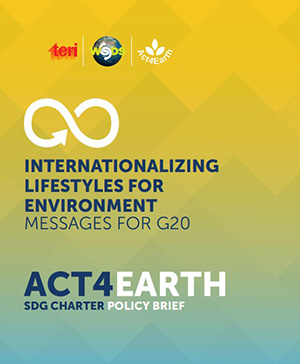Internationalizing Lifestyles For Environment: Messages For G20
Sustainable consumption and lifestyles must be seen from the perspective of resource value chains that include resource extraction, manufacturing, processing, use by consumer, and disposal. Mainstream frameworks on sustainable consumption and production focus more on upstream and mid-stream components, such as resource efficiency and circular economy.
Lifecycle approaches need to consider the consumption of goods and services along with the extraction of resources, production, and disposal. Since demand, including lifestyle choices, drives supply, it is important to focus on downstream components and linkages across resource value chains. To understand the sustainability of lifestyles and consumption for G20 countries and the European Union, a composite index and indices on consumption sectors (such as food, transport, residential, and waste management) are developed in this paper. The objective of this brief is to contribute to the framing of lifestyles and sustainable consumption, as well as implications for internationalizing LiFE. We also examine the application of various instruments to promote LiFE; including policy instruments, market instruments, and social instruments. Implications for internationalizing lifestyles through G20, Global Indicator Framework for SDGs, and United Nations Framework Convention on Climate Change is then discussed.

